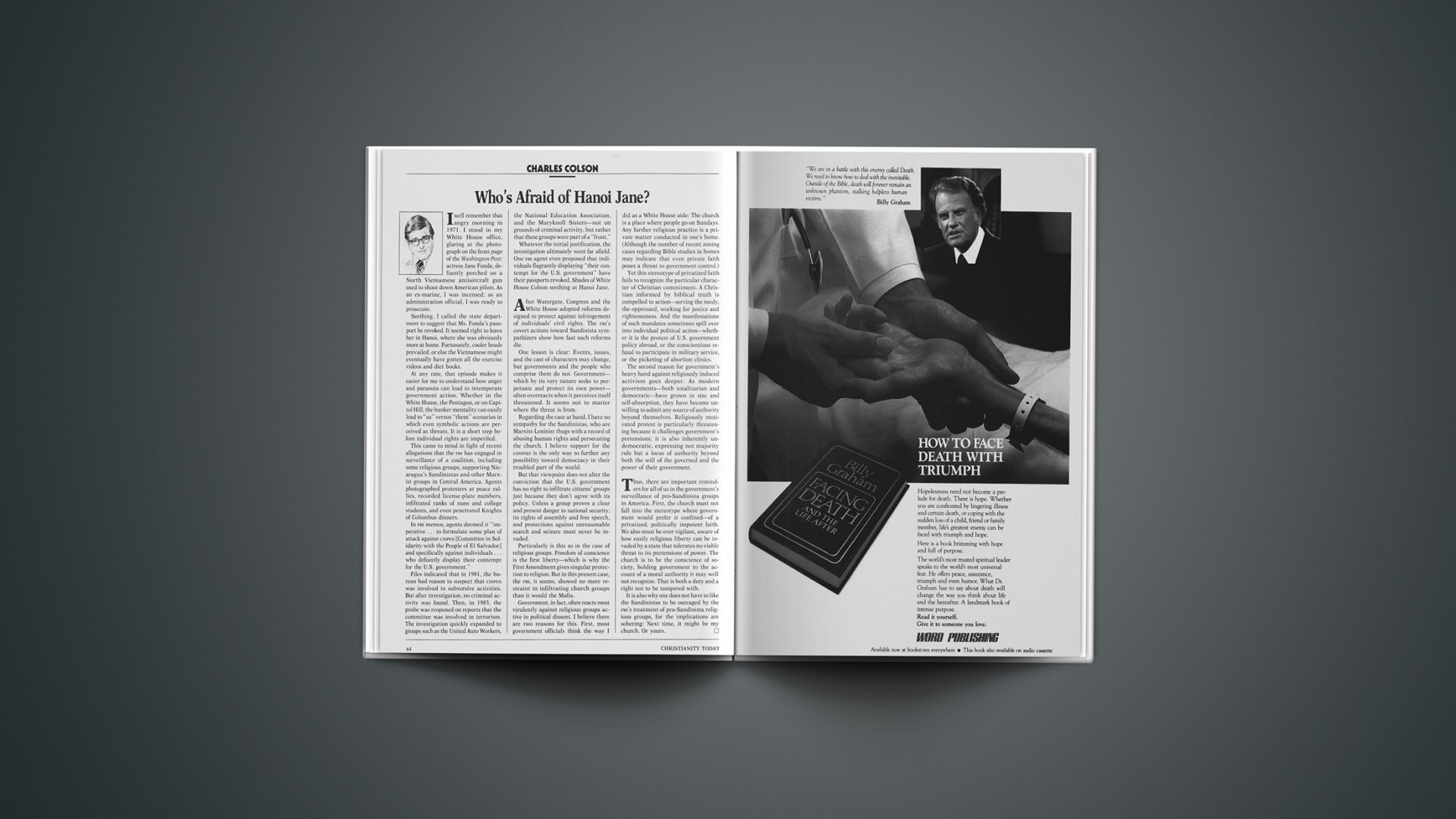I well remember that angry morning in 1971. I stood in my White House office, glaring at the photograph on the front page of the Washington Post: actress Jane Fonda, defiantly perched on a North Vietnamese antiaircraft gun used to shoot down American pilots. As an ex-marine, I was incensed; as an administration official, I was ready to prosecute.
Seething, I called the state department to suggest that Ms. Fonda’s passport be revoked. It seemed right to leave her in Hanoi, where she was obviously more at home. Fortunately, cooler heads prevailed, or else the Vietnamese might eventually have gotten all the exercise videos and diet books.
At any rate, that episode makes it easier for me to understand how anger and paranoia can lead to intemperate government action. Whether in the White House, the Pentagon, or on Capitol Hill, the bunker mentality can easily lead to “us” versus “them” scenarios in which even symbolic actions are perceived as threats. It is a short step before individual rights are imperiled.
This came to mind in light of recent allegations that the FBI has engaged in surveillance of a coalition, including some religious groups, supporting Nicaragua’s Sandinistas and other Marxist groups in Central America. Agents photographed protesters at peace rallies, recorded license-plate numbers, infiltrated ranks of nuns and college students, and even penetrated Knights of Columbus dinners.
In FBI memos, agents deemed it “imperative … to formulate some plan of attack against CISPES [Committee in Solidarity with the People of El Salvador] and specifically against individuals … who defiantly display their contempt for the U.S. government.”
Files indicated that in 1981, the bureau had reason to suspect that CISPES was involved in subversive activities. But after investigation, no criminal activity was found. Then, in 1983, the probe was reopened on reports that the committee was involved in terrorism. The investigation quickly expanded to groups such as the United Auto Workers, the National Education Association, and the Maryknoll Sisters—not on grounds of criminal activity, but rather that these groups were part of a “front.”
Whatever the initial justification, the investigation ultimately went far afield. One FBI agent even proposed that individuals flagrantly displaying “their contempt for the U.S. government” have their passports revoked. Shades of White House Colson seething at Hanoi Jane.
After Watergate, Congress and the White House adopted reforms designed to protect against infringement of individuals’ civil rights. The FBI’S covert actions toward Sandinista sympathizers show how fast such reforms die.
One lesson is clear: Events, issues, and the cast of characters may change, but governments and the people who comprise them do not. Government—which by its very nature seeks to perpetuate and protect its own power—often overreacts when it perceives itself threatened. It seems not to matter where the threat is from.
Regarding the case at hand, I have no sympathy for the Sandinistas, who are Marxist-Leninist thugs with a record of abusing human rights and persecuting the church. I believe support for the contras is the only way to further any possibility toward democracy in their troubled part of the world.
But that viewpoint does not alter the conviction that the U.S. government has no right to infiltrate citizens’ groups just because they don’t agree with its policy. Unless a group proves a clear and present danger to national security, its rights of assembly and free speech, and protections against unreasonable search and seizure must never be invaded.
Particularly is this so in the case of religious groups. Freedom of conscience is the first liberty—which is why the First Amendment gives singular protection to religion. But in this present case, the FBI, it seems, showed no more restraint in infiltrating church groups than it would the Mafia.
Government, in fact, often reacts most virulently against religious groups active in political dissent. I believe there are two reasons for this. First, most government officials think the way I did as a White House aide: The church is a place where people go on Sundays. Any further religious practice is a private matter conducted in one’s home. (Although the number of recent zoning cases regarding Bible studies in homes may indicate that even private faith poses a threat to government control.)
Yet this stereotype of privatized faith fails to recognize the particular character of Christian commitment. A Christian informed by biblical truth is compelled to action—serving the needy, the oppressed, working for justice and righteousness. And the manifestations of such mandates sometimes spill over into individual political action—whether it is the protest of U.S. government policy abroad, or the conscientious refusal to participate in military service, or the picketing of abortion clinics.
The second reason for government’s heavy hand against religiously induced activism goes deeper. As modern governments—both totalitarian and democratic—have grown in size and self-absorption, they have become unwilling to admit any source of authority beyond themselves. Religiously motivated protest is particularly threatening because it challenges government’s pretensions; it is also inherently undemocratic, expressing not majority rule but a locus of authority beyond both the will of the governed and the power of their government.
Thus, there are important reminders for all of us in the government’s surveillance of pro-Sandinista groups in America. First, the church must not fall into the stereotype where government would prefer it confined—of a privatized, politically impotent faith. We also must be ever vigilant, aware of how easily religious liberty can be invaded by a state that tolerates no viable threat to its pretensions of power. The church is to be the conscience of society, holding government to the account of a moral authority it may well not recognize. That is both a duty and a right not to be tampered with.
It is also why one does not have to like the Sandinistas to be outraged by the FBI’S treatment of pro-Sandinista religious groups, for the implications are sobering: Next time, it might be my church. Or yours.










